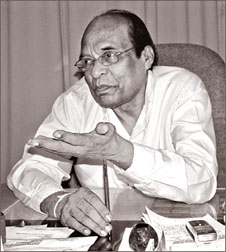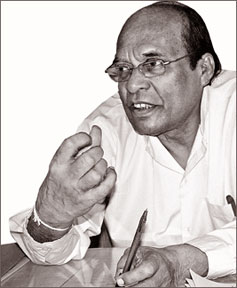|
Prison reforms:
Rehabilitation a priority - DEW
By Uditha KUMARASINGHE
 Rehabilitation and Prisons Reforms Minister
D.E.W.Gunasekera says complete radical reforms are necessary to change
the colonial outlook of the Prisons Department. His Ministry has
embarked upon the process of introducing amendments to the Prisons
Ordinance which is out dated and over a hundred years old. Rehabilitation and Prisons Reforms Minister
D.E.W.Gunasekera says complete radical reforms are necessary to change
the colonial outlook of the Prisons Department. His Ministry has
embarked upon the process of introducing amendments to the Prisons
Ordinance which is out dated and over a hundred years old.
The Minister in an exclusive interview with
the Sunday Observer said his Ministry alone has no ability to make
prison reforms. The Justice Ministry, Police Department and Judiciary
should also extend their cooperation for speedy implementation of
reforms.
The minister pointed out that the purpose of
sending a person to jail was to rehabilitate and not for punishment. He
also stressed the importance of taking a humanitarian view of the whole
problem by prison officials and public as well.
Excerpts:
Q: What is the progress of the committee appointed by you to
formulate prison reforms?
A: This is a 12 member committee consisting of two former
commissioners and other eminent persons in specialised fields.
They have given me an interim report. I have asked them to go through
all past commission reports, interview relevant officials and prepare
something for immediate implementation. My plan is short-term and
medium-term but not long-term, to completed within 4-5 years. The
interim report, will be implemented from next week.
 The Prisons Department (PD) was established in 1844. Itís of the few
departments in the public service which has not undergone change. All
its past commission reports have not even been touched. As a result, a
radical transformation is necessary. We want to implement some legal
reforms and introduce amendments to the Prisons Ordinance. which came
into effect in 1867, and amended a few times thereafter. The Prisons Department (PD) was established in 1844. Itís of the few
departments in the public service which has not undergone change. All
its past commission reports have not even been touched. As a result, a
radical transformation is necessary. We want to implement some legal
reforms and introduce amendments to the Prisons Ordinance. which came
into effect in 1867, and amended a few times thereafter.
Prison officials are under the impression that a prisoner is sent by
courts to prison as punishment. They are beaten, harassed and given hard
work to do. The purpose of sending a person to jail is to rehabilitate
and not for punishment.
This should be inculcated into the minds of prison officials. Itís
one of the biggest reforms underway. Their entire outlook has to be
changed. Their colonial designation, `Jailorí will be changed to
`Rehabilitation Officerí, and the PD to `Rehabilitation Centreí. We have
to take a humanitarian view of this whole problem. Our prison officials
have never been sent abroad for training. We have to widen their vision.
A completely new outlook has to be created in their minds.
There are a number of stakeholders involved. I will have to get the
co-operation of the Police Department, Judiciary and the Justice
Ministry for the speedy implementation of reforms. What I have proposed
is that without the police and the judges sending a person to remand
they can order that he report to the police once a week. This is a move
to bring down the number of persons in remand prison through the
co-operation of the police.
Q: There are thousands of people in remand who are jailed
because they could not pay a small fine. This leads to congestion in
prisons. Can anything be done about this?
A: Fines have been imposed by judges as an alternative to
jail. As they come from very poor families, they are unable to pay the
fine. and are compelled to spend their time in prison. I canít do
anything on my own regarding this. Religious and voluntary organisations
have come to my assistance. For example, as failure to pay Rs. 1,500,
some prisoners remain in jail for three months. We have to spend Rs.261
per person per day to keep them in jail. If you multiply this by 90
days, you can see what a large amount of money is wasted.
Approx 7,000 people are in prison who have defaulted in the payment
of their fines. The matter of bailing out prisoners will also have to be
taken up by the Justice Ministry.
Congestion in prisons is one of the biggest questions we have faced.
The capacity is for 11,000 but we have over 25,000 prisoners. This issue
from the late 1940s still remains unsolved. The situation is beyond my
control as its under the purview of the Justice Minister.
Q: What are the steps taken to ensure the safety and
protection of those who are serving a prison sentence or are in remand?
A: I think there is no problem on the safety of prisoners.
Some escapes have taken place in transit when prisoners are taken from
courts. There have been no big jail-breaks. We are taking precautionary
measures.
There are two categories of prisoners-remand prisoners and convicts.
Remand prisoners are presumed to be innocent until they are found
guilty. They are treated as convicts in prisons.
Some remand prisoners are in prison for several years. They have
suffered enough. Remand prisoners should be treated as ordinary
citizens.
Q: Has the Ministry formulated any comprehensive program for
the social reintegration of those who serve time in prison after
rehabilitation?
A: This is a completely new task and not entrusted to my
Ministry. I have stressed the importance of monitoring prisoners after
release. Through Rehabilitation Officers we want to prepare a program to
monitor them at district level through our officers and AGAs to connect
them into various religious organisations.
Nearly 50 percent of convicts come back. Rehabilitation is necessary
both in prisons as well as after release.
Q: How has the Ministry planned to create an environment where
prisoners can enjoy their basic human rights?
A: We have to create a new environment and a conducive atmosphere
within prisons. Congestion is the main problem faced at present. Nearly
50 percent of prisoners are drug addicts. We have to keep them
separately.
If we keep everyone together, rehabilitation will not be possible. We
are thinking of setting up a centre for the rehabilitation of drug
addicts. If we keep them here, they will have direct contact with drug
importers and the under world. That is one of the main reasons to take
them away from Colombo. Some prisoners are employed by drug importers
and drug sellers. Most prisoners are drug consumers and retail sellers
employed by the drug importers and drug wholesalers.
Health of prisoners is another area we are focused on. Priority will
be given to provide them better toilet and water facilities. We find 4
or 5 toilets for 300 prisoners. I have inspected them. Medical
facilities will also be looked into.
Some 50 percent of prisoners are reconvicts. Some are there for the
eleventh time. I have got a department called the Community Based
Corrections Department. Officials there give prisoners community work in
government departments and other relief organisations for 50 to 300
hours instead of sending them to jail and allow them to report for work
from home.
Congestion will diminish. During the last year 18,000 were sent to
correction houses instead of jail. Re-offenders are only about 10
percent. When we send them to jail, the re-offender rate is about 50
percent.
Q: Do you have any plans to place inmates in open camps
instead of confining them to prison cells and give them a chance to
contribute to the national economy?
A: We have already set up two camps in Weerawila and
Polonnaruwa. Recently at Polonnaruwa, we got about Rs.3.6m worth of
paddy produced by inmates. Our policy is to use inmates for productive
purposes such as agriculture and industries. As medium-term reforms, we
have taken a decision to relocate. A place in Wellawaya of about 500
acres has been looked at.
This is for convicts with the intention of utilising their services
for productive purposes. New prisons will be open unless it is a
necessity that a prisoner be kept under a closed one. Bogambara Prison
will be closed and its prisoners will be taken to Pallekele open prison
in 2012. Over-crowding takes place in prisons in Colombo. Some remand
prisoners will be transferred to stop congestion in Welikada.
Q: Does the Ministry intend to look into difficulties faced by
families of detainees while they serve their sentence?
A: If we analyze 25,000 prisoners, about 10 percent of them
have never gone to school. 70 percent are below expected education
level. A majority of prisoners are uneducated and also coming from poor
families. Families really suffer because of them. The punished are their
wives and children. Prisoners get food but their wives and children
starve.
Q: The Bureau of the Commissioner General of Rehabilitation
has launched a program to rehabilitate child soldiers and ex-combatants
and re-integrate them into society. What is the progress achieved by
this program?
A: By the end of the war we had nearly 12,000 ex-combatants.
Of them all child soldiers have been handed over to their parents. There
were about 2000 women. Nearly 1,000 of them have been released. Others
are undergoing training in industry and will be released after their
training. We have about 1,100 hardcore tigers.
They are detained pending investigations. It is beyond our control as
we are only custodians. But the balance we find about 7,000. that means,
of this 12,000 ex-combatants, only 7,000 are in custody. Arrangements
have been made to provide vocational training and education to these
7,000 ex-combatants. About 500 of them are siting for the O/L and A/L
examinations this year. Those marginally involved with LTTE will be
released after rehabilitation.
Q: There are allegations that some prisoners are enjoying
luxury in their cells, having mobile phones and even directing crimes
from their cells. Is there any truth in this?
A: Last week, we conducted a raid and found that all women
prisoners had mobile phones, money, drugs. Prison is a breeding centre
for crimes. In 1949, Commissioner of Justice E.F.N. Gratien in his
commission report has identified the PD as a breeding centre for crimes
and made 92 recommendations. Except four or five of them the other
recommendations have not been implemented.
Q: There are proposals to shift some of the main prisons in
the country such as Bogambara in the city centre to other areas to free
up space for commercial development. Are these plans still being
considered?
A: We have already identified a 500-acre land plot in
Wellawaya. Moneragala for an open prison. We have valuable land in
Welikada and we can easily hand it over back to the Treasury. The main
problem is to find money to set up prisons. I think that can be done.
Because when we return our land, the treasury will use it and give us
money.
The treasury has already approved the re-location of prisons in
cities such as Colombo, Kandy, Galle, Matara and Tangalle. We only want
to keep remand prisoners in cities.
As remand prisoners are necessary for trials in court cases, they
must be kept closer to the courts. All other convicted prisoners will be
taken to open air in the remote areas such as Pallekelle and Weerawila.
Q: Any plans to bring back capital punishment to reduce the
high crime and murder rate?
A: Not so far. I donít think bringing back capital punishment
will be a solution to reduce crime.
|

